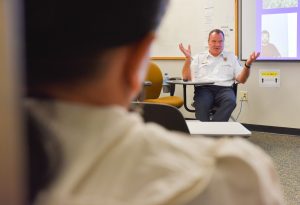The Town of Chapel Hill’s Fire Chief, Matt Sullivan, recently spoke to students in the Division of Clinical Rehabilitation and Mental Health Counseling about trauma, crisis, and wisdom he has learned during his varied, multi-decade career.

Sullivan, whose background spans law and social work, draws from his past experiences and life lessons to inform his work as fire chief.
“The work you do with people; it’s all done with the same tools as used in counseling,” Sullivan said. He left the program’s students with a list of tips for experiences they might encounter as future counselors.
He credited three transformative experiences with giving him insight into his current role as fire chief: responding to the terrorist attacks on September 11, 2001, undergoing a triple-bypass open heart surgery at age 50, and the death of his niece during the mass shooting at Sandy Hook Elementary School in 2012.
Sullivan encouraged the division’s students to practice counseling outside of an office setting at some point during their careers.
“That’s where some of the best work gets done,” Sullivan said. He discussed that crisis and trauma counseling can occur in the community in response to traumatic events.
During his talk, Sullivan used local examples, such as an ice storm in the early 2000s and Hurricane Florence, to show students the importance of empathy and crisis communications.
In these circumstances, Sullivan explained, it is crucial for crisis workers to be trained in specific, critical incident responses that emphasize strong communication skills appropriate for traumatic events.
“What does the community need to hear, when they need to hear it? How do they hear it?” he asked students. “The highest risk, most at-risk individuals are the ones who continue to go without.” Appropriate communication strategies help facilitate effective and prompt referrals for services.
Sullivan also spoke about long-lasting characteristics of a crisis, including retriggering aspects, lasting experience, and individualized reactions to crisis.
“It’s important to recognize that trauma sticks,” he said. “When you’re interacting with people, you’re not just dealing with them in this moment. You’re dealing with them in their historical context. So, how do you understand that? You ask.”
The division frequently invites Sullivan to work with students on appropriate trainings for crisis intervention, crisis counseling and trauma work. In the program, students receive training on providing counseling services to people in community settings and learning specific crisis intervention strategies to use with people dealing with acute stress or post-traumatic stress.
Judy Schmidt, EdD, CRC, LPCA, said students learn about the emotional states that may occur after a trauma and how those states involve grief and loss, which in turn impact daily living and relationships.
“Being able to help people communicate their needs, locate resources, and learn effective coping skills during and after a traumatic event promotes a more stable healing process,” Schmidt said.
